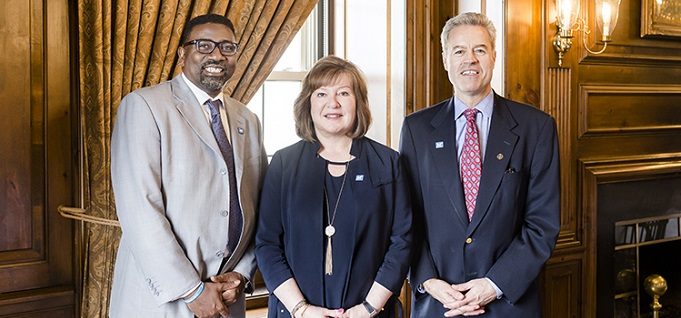A K-16 pathway
By AACC 21st Century Center Staff
May 14, 2019
In Milwaukee, three partners are working to serve urban populations with an open access mission and philosophy.
Knowing that providing a quality education to Milwaukeeans is a key to unlocking Milwaukee’s potential and driving economic growth in the region, Milwaukee Public Schools (MPS), Milwaukee Area Technical College (MATC), and the University of Wisconsin Milwaukee founded in 2015 the M³ initiative. The partners started with a vision to transform greater Milwaukee by increasing college retention, graduation, career success and the strength of the local economy.
M³ provides an easily visible K-16 pathway and its success depends on family and community engagement – as well as the internal leadership of more than 150 individuals from across the three institutions.
The initiative has five interrelated goals:
1. Raise aspirations, college readiness and student success
2. Educate families about the value of postsecondary learning
3. Align curriculum and services from middle school to postsecondary education
4. Create and cultivate a culture of learning that expects continued education after high school
5. Engage student voices, create safe spaces, and commit to equity and inclusion
A leadership team, with members from each institution, is assigned to each of the five goals.
In a short time, M³ has shown success. According to this press release, the MPS four-year graduation rate rose from 58.2 percent for the class of 2015 to 62.2 percent for the class of 2017. Final 2018 numbers are expected to rise another few percentage points. The percentage of MPS graduates entering college within one year rose from 44.2 percent for the class of 2015 to 46.2 percent for the class of 2017. The initiative also boosted the percentage of MPS students completing the Free Application for Federal Student Aid (FAFSA) from 60.8 percent in 2016 to 74.6 percent by 2018.
The initiative has become increasingly attractive to external funders. To date, M³ has received more than $1 million in external funding to support different aspects of its work, including expansion of the Milwaukee Parent Institute, development of a dual enrollment course, and summer math preparation programming.
Read more promising practices in K-12/college partnerships in this meeting summary from the March convening of the American Association of Community Colleges and AASA, The School Superintendents Association.



